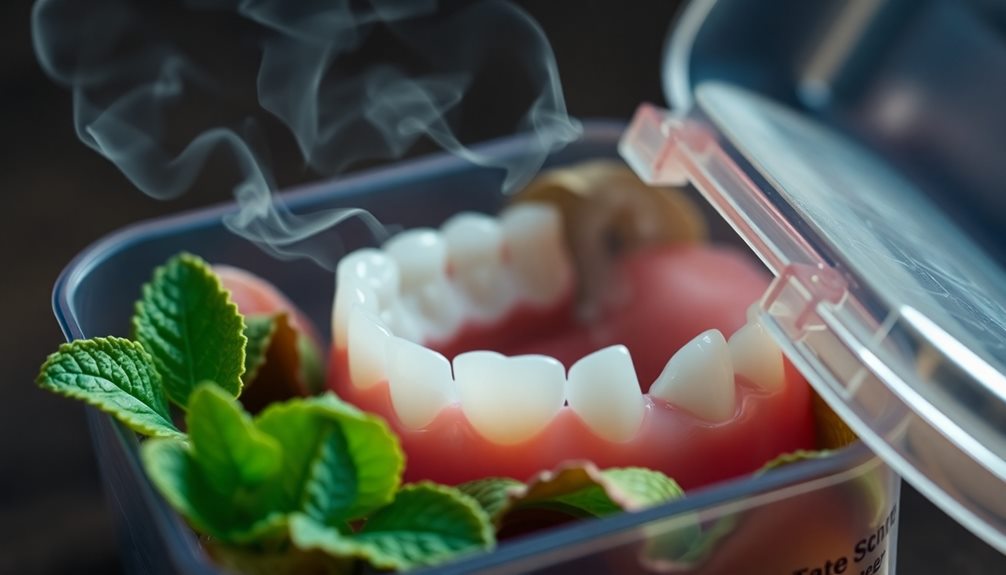Denture breath usually smells pretty unpleasant, like stale food or even decay. This odor can make social situations awkward, leaving you feeling embarrassed. The smell comes from the accumulation of bacteria and food particles on your dentures, especially when they're removed. You might notice a sour or musty scent that could affect your confidence in conversations. But don't worry! Regular cleaning and soaking your dentures can help keep that foul smell at bay. By taking these steps, you can boost your fresh breath and self-esteem, and there's even more you can do to maintain a pleasant smile!
Key Takeaways
- Denture breath often has an unpleasant odor resembling stale food and decay due to bacteria accumulation.
- The smell can include sour and musty notes, especially when dentures are removed.
- Food particles on dentures create an environment for bacteria that produce gas, contributing to the odor.
- Strong-smelling foods like garlic and onions can exacerbate denture breath when combined with buildup.
- Recognizing the smell can motivate denture wearers to improve their oral hygiene practices.
Introduction

Denture wearers often face an unwelcome companion: denture breath. You mightn't think about it every day, but it can sneak up on you. Imagine chatting with friends or family, and suddenly you're worried about that pesky odor hanging around.
It's not just you; many people with dentures experience this issue.
The good news is that you're not alone, and there are simple strategies to help you combat denture breath.
First, keeping your dentures clean is essential. Just like brushing your teeth, you should clean your dentures daily to remove food particles and bacteria. You might also want to use a special denture cleaner for that extra freshness.
Staying hydrated is another great tip. Drinking plenty of water helps wash away odor-causing particles in your mouth. Plus, it keeps your breath fresh!
You can also chew sugar-free gum or mints for a burst of freshness when you're out and about.
Description of the Smell
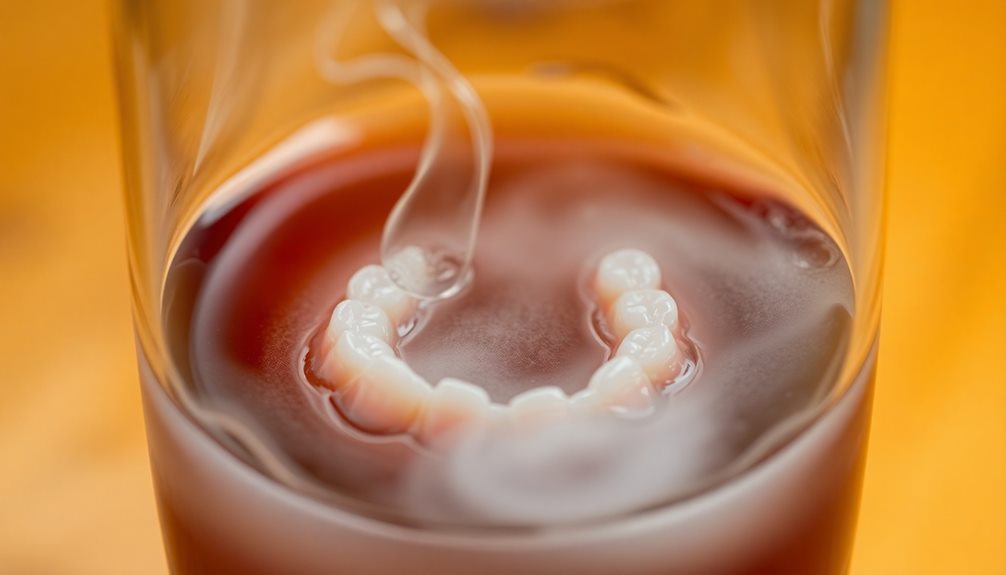
The smell associated with denture breath can be quite unpleasant, often described as a mix of stale food and decay. Imagine the scent of old leftovers left too long in the fridge, combined with a hint of something that's just not fresh anymore.
You might notice a sour, musty odor that lingers in the air, making it hard to ignore. This smell can be particularly strong when you first take out your dentures, as bacteria and food particles build up over time.
For many, this odor can be embarrassing, especially during conversations or close encounters. You might find yourself feeling self-conscious, wishing you could just freshen your breath instantly.
The smell can sometimes remind you of something rotting, reminiscent of forgotten fruit or a damp basement. It's essential to recognize that denture breath isn't just a minor inconvenience; it can affect your confidence and interactions with others.
Understanding this smell can help motivate you to maintain good oral hygiene, ensuring a fresher breath. By addressing the issue, you can feel more at ease and engaged in conversations, enjoying those moments without worry!
Source and Composition
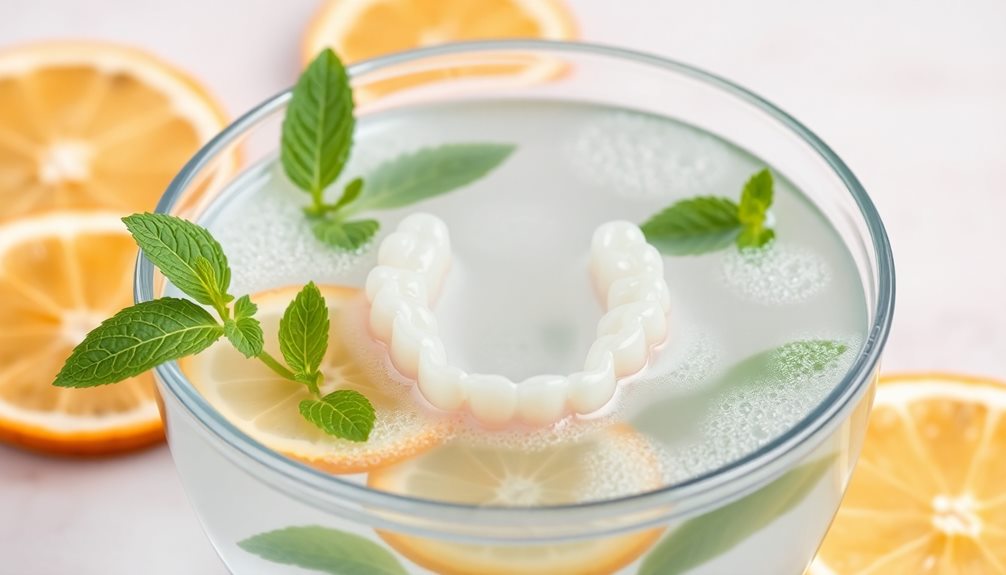
Several factors contribute to the source and composition of denture breath, primarily involving bacteria and food particles that accumulate on the dentures and in the mouth.
When you wear dentures, tiny bits of food can get stuck, creating a cozy spot for bacteria to thrive. These bacteria break down food particles and produce gases, which can lead to that unpleasant smell.
Additionally, saliva plays a role in this process. It helps wash away food and bacteria but can sometimes create an environment that allows odors to develop. If you don't clean your dentures properly, plaque can form, leading to even more bacteria growth and bad breath.
Think about it: when you eat, some foods, like garlic or onions, can leave a lingering scent.
When combined with the buildup on dentures, this can create a unique, not-so-pleasant aroma. Regular cleaning and soaking your dentures can help eliminate these odors and keep your breath fresher.
Typical Scenarios or Environments
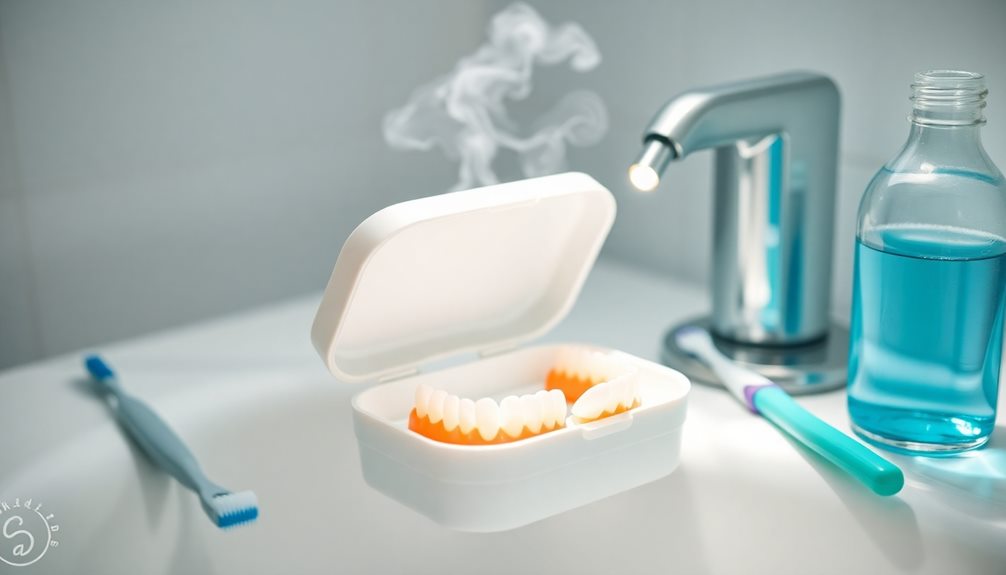
In social settings, like family gatherings or dinner parties, you might notice denture breath becoming more pronounced. This is especially true when people gather around for food and conversation. You may spot a loved one laughing and chatting, but if they wear dentures, you might catch a whiff of something unusual.
In these moments, the mix of food aromas and denture breath can create a unique scent. You might feel a little self-conscious as you engage in conversation, wondering if others notice the smell. It's common for denture wearers to be unaware of their breath, especially in busy, lively environments.
If you're close to someone with dentures, you might want to gently hint at freshening up if the breath becomes noticeable. In quieter settings, like a doctor's office or during a movie, the smell might be less distracting. Yet, the environment can still play a role in how strong the denture breath is.
Emotional or Cultural Associations
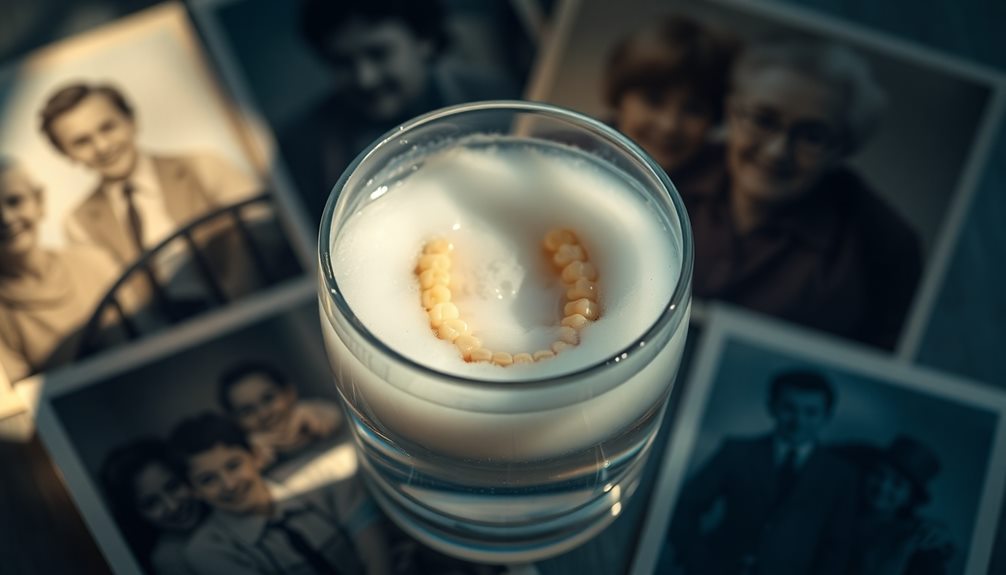
Social interactions often carry emotional weight, and for many denture wearers, breath odor can evoke feelings of embarrassment or self-consciousness. You might worry that others can smell your breath, which can make you hesitant to engage in conversations. This concern isn't just personal; it can also reflect cultural attitudes toward oral hygiene and social interactions. In some cultures, fresh breath is a sign of good health and respect for others.
If you've ever felt anxious about your breath, you're not alone. Many denture wearers face similar feelings. They might avoid social gatherings, fearing judgment, or they might hold back laughter, feeling insecure about their breath. These emotions can build walls, making it harder to connect with friends or family.
But remember, it's important to focus on solutions rather than letting fear dictate your social life. You can boost your confidence by maintaining good oral care and having freshening products on hand.
Health or Safety Considerations
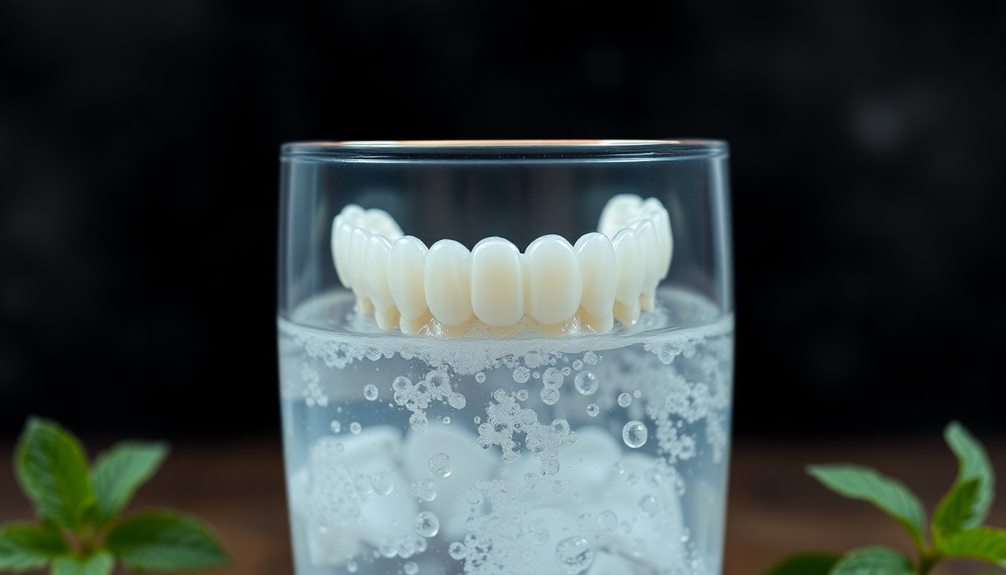
Maintaining good oral health is crucial for denture wearers, as neglecting it can lead to unpleasant breath and other complications. When you don't clean your dentures properly, bacteria can build up, causing bad odors. These bacteria can also lead to gum infections and other serious health issues. You wouldn't want that, would you?
Make sure to rinse your dentures daily and soak them in a cleaning solution designed for dentures. This helps remove food particles and bacteria, keeping both your dentures and your mouth fresh.
Regularly brushing your gums and tongue can also make a big difference. It's all about creating a clean environment in your mouth!
Don't forget to visit your dentist regularly. They can check your dentures and your oral health, ensuring everything's in tip-top shape.
If you notice a change in your breath or any discomfort, don't hesitate to reach out to your dental professional. They're there to help you!
Final Thoughts
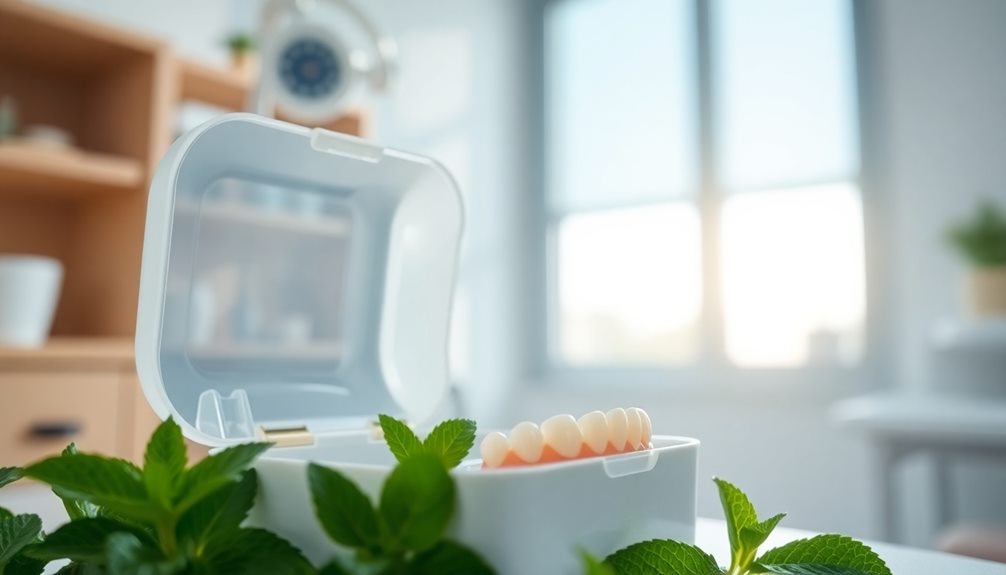
Taking care of your dentures is essential for enjoying fresh breath and good oral health. When you wear dentures, bacteria can build up, leading to unpleasant odors. That's why it's crucial to clean your dentures daily. A simple routine of brushing them with a specialized cleaner can make a big difference. You wouldn't skip brushing your natural teeth, right?
Make sure to soak your dentures in a cleaning solution overnight. This helps eliminate any stubborn bacteria and keeps your dentures looking bright.
Plus, don't forget to brush your gums, tongue, and the roof of your mouth daily. This will also help fight bad breath!
If you notice any persistent odors even after cleaning, it might be a sign to visit your dentist. They can check for any issues and provide helpful advice.
Frequently Asked Questions
Can Denture Breath Affect My Social Interactions?
Yes, denture breath can definitely impact your social interactions. If you're self-conscious about the smell, it might make you hesitant to engage with others. Maintaining good oral hygiene can help you feel more confident in social situations.
How Can I Prevent Denture Breath?
To prevent denture breath, you should clean your dentures daily with a soft brush and mild soap. Rinse them thoroughly, soak them in a denture cleaner, and maintain good oral hygiene to keep your breath fresh.
Are There Products Specifically for Freshening Denture Breath?
Yes, there are products designed specifically for freshening denture breath. Look for denture cleansers, mouthwashes, or sprays that target odor. Regular cleaning and using these products can help keep your breath fresh and pleasant.
Is Denture Breath a Sign of Poor Oral Hygiene?
Yes, denture breath can indicate poor oral hygiene. If you don't clean your dentures properly, bacteria can build up, leading to bad odors. Maintaining good hygiene helps you avoid unpleasant breath and keeps your mouth healthy.
Can Diet Influence the Smell of Denture Breath?
Yes, your diet can definitely influence the smell of your breath. Foods like garlic or onions can linger, affecting how your dentures smell. Staying hydrated and maintaining a balanced diet helps reduce unpleasant odors significantly.
